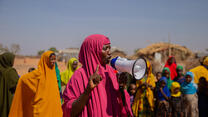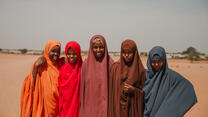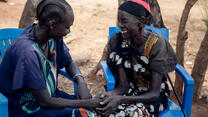The Generation Equality Forum is a civil-society centered, global gathering for gender equality convened by UN Women and co-hosted by the governments of Mexico and France, in partnership with youth and civil society. The Forum kicked off in Mexico City from 29 to 31 March and culminated in Paris from 30 June to 2 July 2021, where a series of concrete, ambitious and transformative actions to achieve immediate and irreversible progress towards gender equality were launched. The Actions launched in Paris will be complemented by commitments made by governments, IOs, INGOs and NGOs towards their achievement.
The Generation Equality Forum can and should drive progress towards gender equality in humanitarian contexts. IRC has called for the Generation Equality Forum (GEF) to be purposefully inclusive of achieving gender equality in humanitarian contexts. We have made connections to the GEF’s work across a number of sectors, such as preventing and responding to gender-based violence (GBV), women’s economic empowerment, and food security. We have been gratified to see the inclusion of a Women Peace and Security and Humanitarian Action Compact in the GEF process, and the inclusion of specific actions to gender equality in humanitarian contexts across multiple Action Coalitions.
The GEF has also galvanized action within IRC because we have seen, through efforts like the Sustainable Development Goals, how critical it is to link humanitarian and development/human rights commitment processes from the outset. The GEF holds the potential to replace the Beijing Declaration for Action in terms of importance in focusing attention and funding towards specific efforts in the fight to achieve gender equality. Women and girls living in humanitarian contexts must therefore be a key population in both the Acceleration Plan and commitments.
To that end, the IRC is proud to put forward commitments at the Generation Equality Forum that connect humanitarian action to this important forum. The IRC’s commitments at the GEF are in line with our historical leadership in the field of prevention of and response to gender-based violence in emergencies, work to improve humanitarian the economic outcomes of refugee and displaced women and girls, and intersectional feminist ambitions for our organization and the humanitarian system.
Beyond the commitments below, the IRC is pleased to join many other civil society organizations, governments, and international organizations as a signatory of the Women Peace and Security and Humanitarian Action Compact.
IRC’s Commitments to the Generation Equality Forum:
- The IRC continues to prioritize our work to prevent and respond to GBV in humanitarian contexts throughout our programming. We re-commit to the Call to Action on Protection from Gender-Based Violence in Emergencies (CtA), reaffirm our commitments made to the 2021-2026 CtA Road Map, and pledge to continue advocating with our fellow CtA partners for the full inclusion of women and girls in humanitarian contexts wherever gender equality commitments are being made.
- The IRC commits to increase the resources we provide to local actors by half in 2021 (compared to 2020) to jump start progress on humanitarian aid reform, particularly through the Grand Bargain process. We will continue to build strategic partnerships with local actors, half of whom will be women-led, and strengthen our internal systems to start reporting to the Financial Tracking Service managed by UN OCHA by 2024 or earlier and channeling 25% of our funding to local and national responders by 2024.
- The IRC commits to continuously advocate with key donors, multilaterals and host governments for the need to address the barriers women face to accessing financial services and livelihoods in their host countries, based on evidence we are generating. Building on the IRC’s research on these barriers, which drew on the World Bank’s Women Business and the Law index data and in a range of countries including Niger, Kenya, Germany, Jordan, Nigeria and Greece, we will call for the inclusion of women affected by crisis and displacement in initiatives to support women’s economic recovery post COVID-19.
- The IRC is entering a new phase in our efforts to be an intersectional feminist organization that prioritizes equity, diversity, and inclusion in our internal structures and policies as well as our programming for and with clients. The below commitments reflect critical learnings of the past year on the need for the IRC and humanitarian system as a whole to become anti-racist and ensure we do not replicate colonial power imbalances, while building on and strengthening the nearly decade-long work of the IRC’s Gender Equality Unit. Our commitments in this new phase include but are not limited to:
- The creation of a new Gender, Equality, Diversity and Inclusion (GEDI) Unit to action our vision for the IRC where our diverse clients, partners, and staff have the power, voice, and agency to shape programs and operations. IRC is a place where we actively work to end all forms of systemic discrimination and foster an inclusive working environment where everyone feels respected, heard, valued, and supported within the IRC, and our programs seek to reduce disparities in outcomes which are driven by systemic inequality;
- Creation of new goals and metrics to achieve our vision for the IRC across all areas we work, including but not limited to:
- Leadership diversity related to gender identity, race/ethnicity, and nationality, including that 50% of our global and regional senior leaders identify as races/ethnicities under-represented in global power structures.
- Piloting client engagement models across ~60% of our Resettlement, Asylum, and Integration (RAI) offices including but not limited to participatory design, client advisory bodies, focus groups and office panels.
- Identify local civil society organizations with whom to prioritize building long-term strategic relationships in each IRC office (this will amount to at least 150 organizations).
- Being public and transparent about our progress towards our GEDI goals and ambitions, as we have been through our Gender Action Plan and progress reports.



